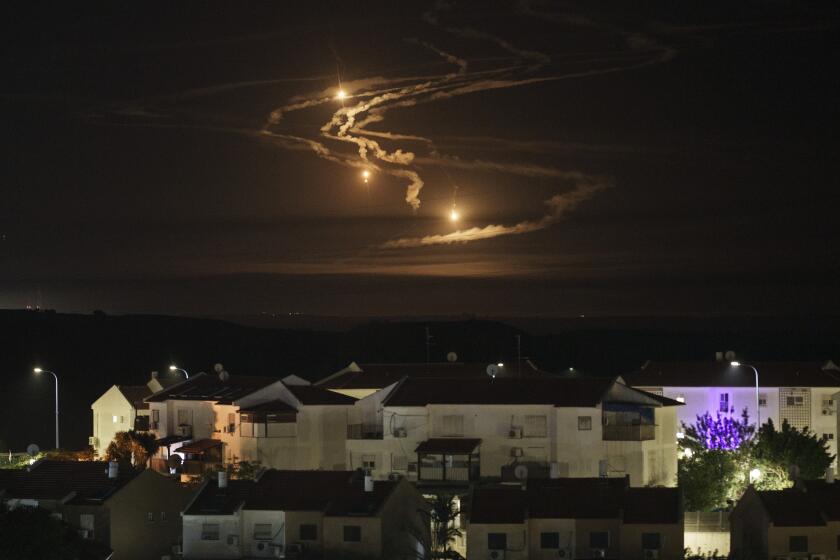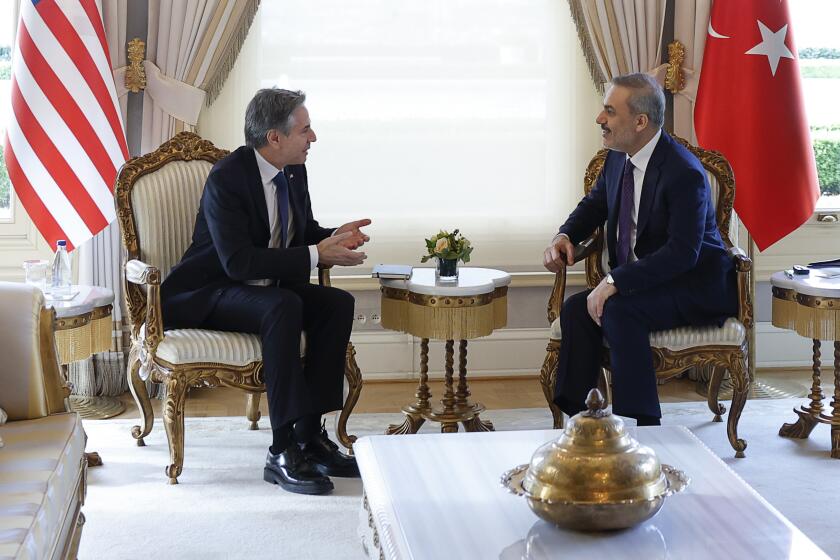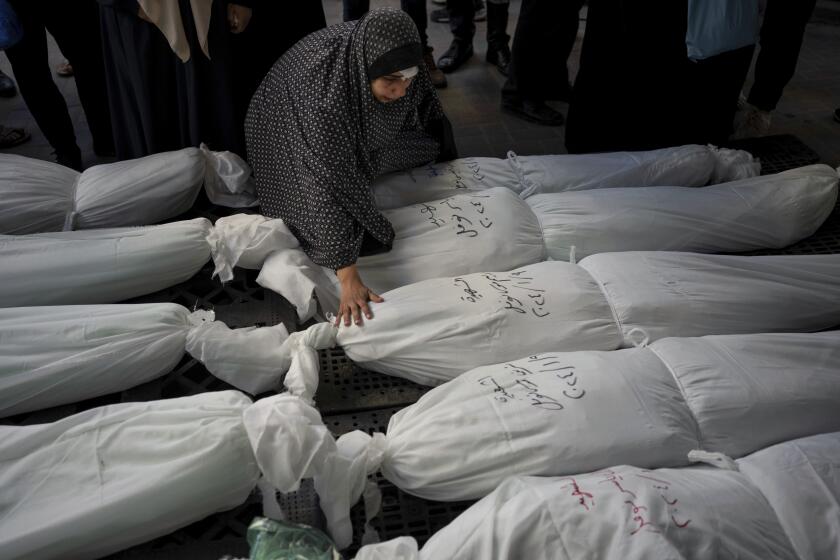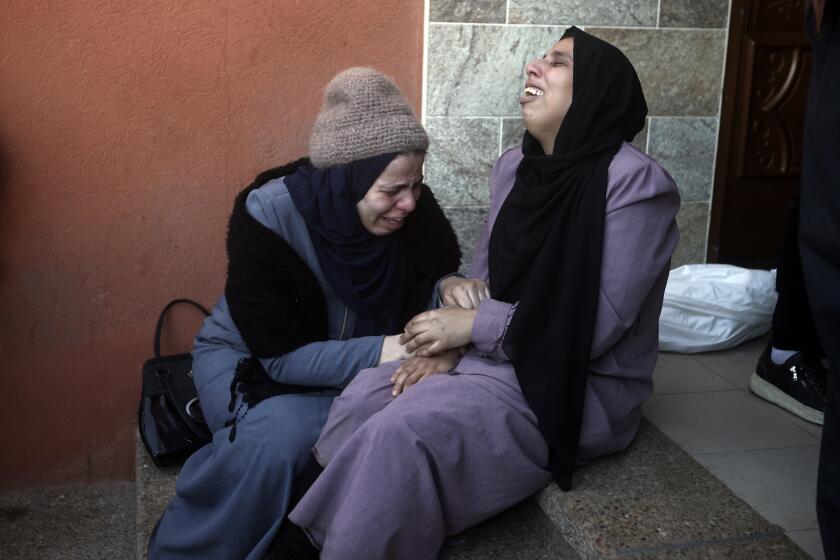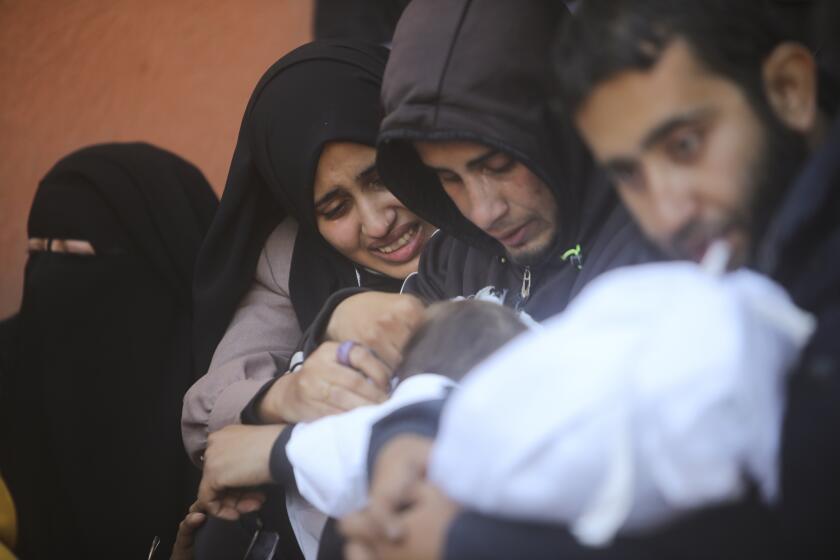Blinken adds Israel stop to latest Mideast tour as tensions rise over Gaza war
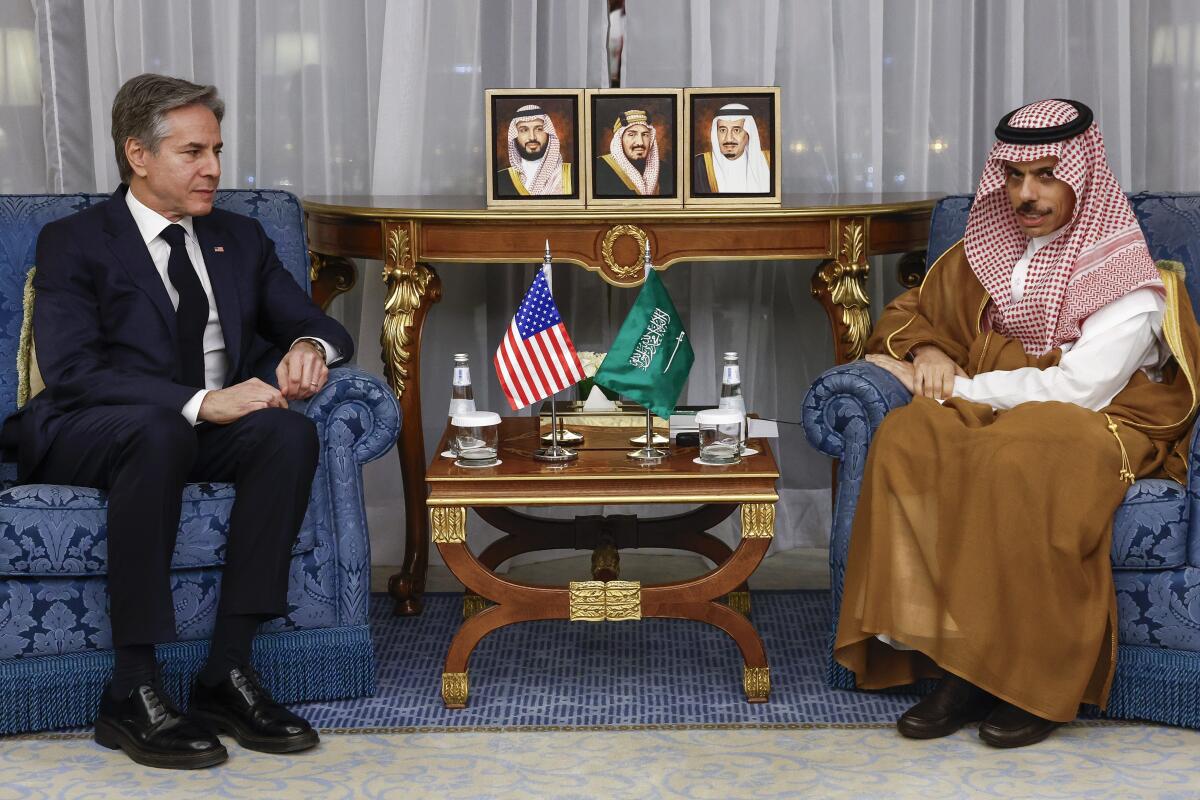
- Share via
JEDDAH, Saudi Arabia — U.S. Secretary of State Antony J. Blinken will travel to Israel this week as part of his sixth urgent mission to the Middle East since the Israelis’ war with Hamas began in October, as relations between the two countries have soured dramatically in recent weeks.
The visit comes amid a flurry of calls, planned trips by U.S. and Israeli officials and public airings of severe disagreements over the state of the conflict — notably Israeli plans to mount a major military operation in the southern Gaza city of Rafah and what will happen to Gaza after the war ends.
The State Department said the Israel stop would cap Blinken’s latest Mideast tour that started in Saudi Arabia on Wednesday and will continue in Egypt on Thursday. The top U.S. diplomat will be in Tel Aviv on Friday after talks with Arab leaders and foreign ministers in Jeddah and Cairo focused on the war in Gaza.
U.S. Secretary of State Antony J. Blinken is holding talks in Israel as he seeks a plan for Gaza’s postwar future even as the fighting continues.
“In Israel, Secretary Blinken will discuss with the leadership of the government of Israel the ongoing negotiations to secure the release of all hostages,” State Department spokesman Matthew Miller said. “He will discuss the need to ensure the defeat of Hamas, including in Rafah, in a way that protects the civilian population, does not hinder the delivery of humanitarian assistance, and advances Israel’s overall security.”
Tensions between the U.S. and Israel over the prosecution of the Gaza war have been mounting for months over rising civilian casualties. And they have intensified as Israeli Prime Minister Benjamin Netanyahu has repeatedly said he will ignore President Biden’s warnings not to start a large-scale ground operation in Rafah without credible plans to protect innocent Palestinians who have sought refuge there.
Biden, facing a tough reelection campaign this year, is under growing domestic pressure to rein in Israel’s military response to the Oct. 7 Hamas attack in Israel. Opposition to the war in the United States, Arab nations and much of the rest of the world has shaped the evolution of Blinken’s frequent trips to the region since October.
U.S. Secretary of State Antony J. Blinken has met with the leaders of Turkey and Greece during the first stop of his latest Mideast diplomatic mission.
His first two visits were largely focused on reaffirming U.S. support for Israel in the immediate aftermath of the Hamas attack, but as civilian Palestinian casualties began to multiply and humanitarian conditions in Gaza deteriorated, his emphasis shifted to boosting humanitarian assistance and protecting innocent people.
Since late last year, Blinken has also used his visits to stress the importance of Arab support for “day after” plans for Gaza and to try to coax Israeli leaders into accepting a status for the Palestinians that could help ensure Israel’s long-term security.
As that shift has taken place, though, the situation in Gaza has gotten worse and relations between the U.S. and Israel have nosedived. Public disagreements between Biden and Netanyahu have become more frequent and more intense.
In a phone call with Biden on Monday, their first in more than a month, Netanyahu agreed to send a high-level delegation to Washington to discuss plans for the proposed Rafah operation, and the Pentagon said Tuesday that Israeli Defense Minister Yoav Gallant would visit the U.S. capital next week.
U.S. Secretary of State Antony J. Blinken has met with Palestinian Authority President Mahmoud Abbas in an effort to secure a future for postwar Gaza.
In his talks in Jeddah, Cairo and Tel Aviv, Blinken is expected to focus on attempts to negotiate a cease-fire and hostage release deal, increase humanitarian aid deliveries to Gaza by land, air and sea, and plan for the territory’s post-conflict future.
In the Red Sea city of Jeddah, Blinken met with Saudi Arabia’s de facto leader, Crown Prince Mohammed bin Salman and Saudi Foreign Minister Prince Faisal bin Farhan. The prospect of normalization of relations between Saudi Arabia and Israel is seen as a potential point of leverage in pushing the Israelis on easing civilian suffering in Gaza.
Blinken and Faisal “discussed the urgent need to protect all civilians in Gaza and immediately increase humanitarian assistance to those in need,” the State Department said, adding that “resolving the conflict” and “preparing for the post-conflict phase” remain a top priority.
Blinken also “emphasized the United States’ commitment to achieving sustained peace through the establishment of an independent Palestinian state with security guarantees for Israel,” the department said in a statement.
Palestinian hospital officials say an Israeli strike hit a home in a southern Gaza “safe zone,” killing at least 12 people, almost all of them children.
But the Saudis have made clear that normalization won’t happen unless it is accompanied by a clear commitment from Israel to accept an independent Palestinian state by a date certain. Netanyahu and many members of his far-right government are opposed to a Palestinian state.
In Cairo on Thursday, Blinken will see Egyptian officials as well as meet with a six-member Arab committee that includes foreign ministers of Egypt, Saudi Arabia, the United Arab Emirates, Jordan, Morocco and the Palestinian Authority, according to an Egyptian diplomat.
This group has been charged with exploring ways to revamp, reform and revitalize the Palestinian Authority for a possible governance role in Gaza once the war is over. The West Bank-based Palestinian Authority has committed to reforms and replaced some of its top leadership.
Blinken’s discussions are also expected to touch on the cease-fire negotiations that have taken on new urgency as the humanitarian situation in Gaza has become increasingly dire.
The Israeli military says it has dismantled the military infrastructure of Hamas in northern Gaza and is shifting its offensive to the south.
Qatari officials, whose country is the main interlocutor with Hamas, said this week they were “cautiously optimistic” after talks with Israel’s intelligence chief in Doha, Qatar’s capital. But, Qatari Foreign Ministry spokesperson Majed al-Ansari said Tuesday that an Israeli ground operation in Rafah would set back any talks.
At least 31,819 Palestinians have been killed, according to Gaza’s Health Ministry, which doesn’t differentiate between civilians and combatants in its count but says women and children make up two-thirds of the dead. A United Nations food agency warned that “famine is imminent” in northern Gaza.
Palestinian militants killed some 1,200 people in the surprise Oct. 7 attack out of Gaza that triggered the war, and abducted about 250 people. Hamas is still believed to be holding some 100 people hostage, as well as the remains of 30 others.
Lee writes for the Associated Press.
More to Read
Sign up for Essential California
The most important California stories and recommendations in your inbox every morning.
You may occasionally receive promotional content from the Los Angeles Times.
